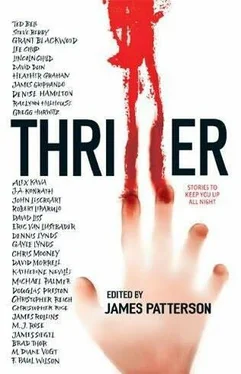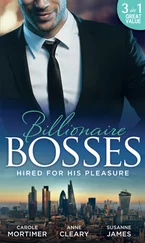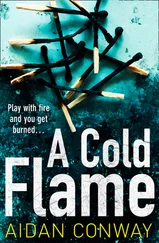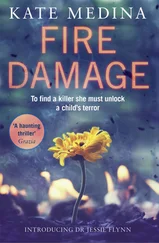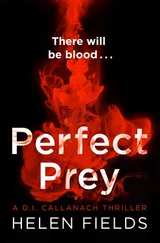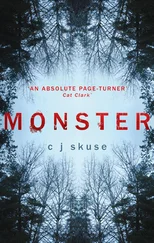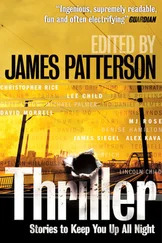Pepe said nothing as he approached. Didn't have to. He had murder in his eyes. And he had Jack cornered.
He fired again. The bullet hit the counter six inches to Jack's right, showering him with splinters as he ducked.
Trapped. Had to find a way to run out Pepe's magazine. How? A lot of those baby semis held ten shots.
He peeked up again. Pepe's slow progress had brought him within six feet. Jack was about to duck again when he saw a blur of bright green and yellow flash into view.
Loretta, moving faster than Jack ever would have thought possible, charged with a gallon container of ice cream held high over her head in a two-handed grip. Pepe might have heard her without the hiss and splatter of the sprinklers. But he remained oblivious until she streaked up behind him and smashed the container against the back of his head.
Jack saw his eyes bulge with shock and pain as he pitched toward the floor. Probably felt like he'd been hit with a cinder block. As he landed face-first, Loretta stayed on him-really on him. She jumped, landing knees first on the middle of his back.
The air rushed out of him with an agonized groan as his ribs shattered like glass.
But Loretta wasn't finished. Shouting, she started slamming the rock-hard container against his head and neck, matching the rhythm of her words to the blows.
"NOW you ain't NEVER gonna point no GUN to my HEAD ever AGAIN!"
Jack moved up beside her and touched her arm. "I think he's got the message."
Loretta looked up at him, then back down at Pepe. His face was flattened against the floor, his head canted at an unnatural angle. He wasn't breathing.
She nodded. "I do believe you right."
Jack pulled her to her feet and pushed her toward the front.
"Go!"
But Loretta wasn't finished. She turned and kicked Pepe in the ribs.
"Told you I was a bitch!" "Loretta-come on!"
As they hustled toward the front, she said, "We even, Jack?" "Even Steven."
"Did I happen to mention my bad mood?" "Yes, you did, Loretta. But sometimes a bad mood can be a good thing."
Ted Bell wrote his first novel for children. In the pre-Harry Potter 1990s, Bell lived in London. The generally inclement weather kept his nine-year-old daughter indoors much of the time. Fine reading weather but, in the neighborhood bookstores, the children's fare was dominated by horror and "message" books. Where was Treasure Island, Captain Blood or their modern equivalents?
So Bell wrote a young-adult novel that recaptured the adventure and romance of his own childhood favorites. In Nick of Time, a boy of eleven and his seven-year-old sister conspire to thwart the Nazi invasion of their small Channel Island just prior to the Second World War. With the aid of a time machine, Nick and Kate also save Nelson's fleet from the wicked pirate Billy Blood. The book was optioned by Paramount Pictures and ultimately translated into seven languages.
After retiring from advertising, Bell began the Alex Hawke series of adult thrillers. Like his first novel, the new books recapture a lost sense of adventure and glamour. The hero of Hawke is Lord Alexander Hawke. As the series begins, three renegade generals abduct Fidel Castro, and turn Cuba into an immediate and frightening threat to the U.S. In the second of the Hawke series, Assassin, Alex Hawke battles an ancient cult of killers who are eliminating U.S. ambassadors and their families, prior to launching a horrific attack on America. The third Alex Hawke book, Pirate, debuted on the New York Times bestseller list. This time, Alex Hawke must stop a French-Chinese oil conspiracy and avert a nuclear showdown with America's latest global rival, China.
The Powder Monkey is a bit different. Here, we travel back in time to 1880. It's the tale of a lovelorn newspaperman's journey to the Channel Islands to learn the true story of the pirate captain Billy Blood's demise. In doing so, our hero learns how a small boy held captive aboard Blood's frigate, Mystere, is saved from certain death.
The boy's name is Alex Hawke.
And his dramatic rescue sets the stage for the further adventures of his later namesake.
London and the Channel Islands, 1880
I'm no hero.
But, I am the proud possessor of a large and rather good nose for news (I scribble for a wretched daily in London) that sometimes leads me to the very edges of peril. I had now the whiff of a cracking good story in my flared nostrils and was doggedly pursuing a most promising lead. Nearing my intended destination, in a freezing downpour, I had the ever-stronger sensation of an appointment with destiny.
At minimum, I believed, this latest venture might have a most happy result, namely, an influx of shillings to feed my woefully depleted coffers.
No, it was not some fleeting sniff of fame or any such nonsense that propelled me forward across that forbidding island's slippery scree. Rather, it was the fervent hope that I might soon possess sufficient funds to escape a grim warren of offices above Blackfriar's Tavern in Fleet Street. This was the joyless home to a tawdry little tabloid called the Daily Guardian.
It was there, under the mean and watchful eye of my editor, an ink addict named Mr. Symington Fife, that I pecked out my meager existence at tuppence a word. My accounts reflected my life's station, I suppose, for I currently had the princely balance of seven guineas, sixpence in the strongbox 'neath my bed. But, salvation appeared to be at hand.
As it happened, the Guardian's chief competitor, a yellow broadsheet called the Globe, had last month announced a new subscription contest in honor of the upcoming seventy-fifth anniversary of Admiral Lord Nelson's great naval victory at Trafalgar. And, by Jove, I meant to win it!
The contest rules were straightforward enough. Any person who submitted a heretofore-unreported tale pertaining to the victory was eligible. The three most surprising and entertaining stories (they had to be historically accurate, of course) would be printed. The best would win a grand prize of seventy-five quid. A king's ransom in my humble view.
All I needed was a smashing tale of the battle and some proof as to its veracity. Of course, for the price of a pint, such rousing stories were easily come by in any pub or tavern. Proving them was another matter entirely. And so it was, with a heartful of hope and my nose twitching madly, that I had set out from London to Trafalgar in search of my liberation.
As you may have suspected, I am a city dweller. I am not, by any stretch, what one might call an "outdoorsman." No, I am hardly one of those stouthearted, broad-shouldered chaps one reads about in the penny novels, off felling trees in the Wild Yukon, scaling Alps or shouting "Sail, ho!" from a pitching masthead. Rather, I'm one who likes his creature comforts and his books.
I reminded myself of this simple fact tripping over a smallish boulder I hadn't even noticed in my path. I suddenly pitched forward at a dangerous angle. Luckily, I managed to break the fall with my outstretched hands, and came away with only minor abrasions and another lashing of wounded pride.
Every passing minute on this blasted island, it seemed, was meant to test my resolve. The footing was treacherous. Needles of horizontal icy rain stung my face; nonetheless, I pressed on. I stumbled and fell again. I got up. I walked on.
You see? By my lights, a cozy armchair by the fireside is a far, far more suitable environment for adventuring than traipsing across the hostile plains of a frozen wasteland. Yet my trusty proboscis would not be denied, and so I pressed onward. The rain did ease a bit on toward evening, I must say. But, soon, the visibility dropped considerably when tendrils of fog nearly obscured the low-hanging sun. It was now merely a hazy yellow wafer sliding toward the sea.
Читать дальше
